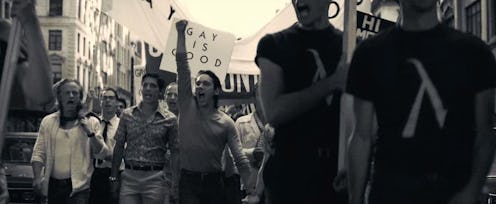Entertainment
'Stonewall' Is In Good Hands With Roland Emmerich

Those familiar with Roland Emmerich’s personal life and activism work should find no surprise in his adoption of a project like Stonewall , which chronicles the buildup to the eponymous LGBT demonstration in 1969 Manhattan. To those who know Emmerich only as a filmmaker, however, the civil rights picture is bound to feel like a vexing departure from his usual brand of alien attacks and exploding White Houses. But does this unfamiliarity with the trade of real world drama necessarily translate to a setback? Or are movies like Independence Day, Stargate, and The Day After Tomorrow in fact excellent practice for a film like Stonewall? There's compelling evidence to the latter.
Among the most critically lamented of cinematic genres is the biopic, and not without good reason. Big screen stories of real world heroes often veer into the territory of idealism, turning out what amounts less often to complex drama than to feature-length tributary. A story like that of the Stonewall riots, recognizing the efforts and influence of the individuals behind this early chapter of the gay liberation movement, is the sort not unlikely to fall victim to sanctimony. But when filtered through Emmerich’s proclivity for blockbuster bombast, we might in fact get something not only more “watchable,” but more respectful to the excitement and intricacies of the true story in question.
When we reflect upon the most enduring filmic testaments to human grandeur and civil progress, we find ourselves looking beyond the confines of the standard dramatic biography picture or historical account — this is especially true when it comes to stories about LGBT affairs. A year out from release, The Imitation Game already begins to wash from public memory. Gus Van Sant’s 2008 portrait of Harvey Milk resonates almost exclusively through its terrific performance by star Sean Penn.
The stuffy and stony form of the contemporary biopic proves time and again to be an unworthy platform for the legacy of queer rights and liberation. Instead, we champion narratives prioritizing romance, comedy, satire, and adventure as those of the greatest contribution to gay-themed cinema. The sort of films that interweave said issues and characters casually into the Hollywood fabric, opting on behalf of its subjects for normalcy rather than idolatry.
We think back to Alfred Hitchcock’s 1948 thriller Rope, which defied the authority of a xenophobic resistance to the acknowledgement of gay men and women by featuring a pair of lead characters all but outright ascertained to be a homosexual couple. This pair was certainly not avowed as heroic; the boys were killers intoxicated by pride. But for Hitchcock, this was normalcy. They were no worse, no better, no different than the average characters to lead a piece of the director’s filmography. And their wicked journey from the beginning to the end of a corrupt dinner party was charged with all the mystery, intrigue, laughter, and sexiness of anything else he had put out to date.
Eleven years later, we leapt into the screwball comedy sphere with LGBT issues on the brain in Some Like It Hot. The tenor of genre kingpin Billy Wilder’s 1959 film is indistinguishable from the remainder of his comedy work, embracing the misadventures of two straight men thrust into homosexual and transgender subtexts with as warm a welcome as he would with his (strictly heterosexual-themed) Best Picture-winning The Apartment one year later. Though unable yet to grapple with such themes with outspoken candor, Rope and Some Like It Hot were perhaps even more progressive than much of the LGBT-themed cinema we’ve seen in more recent decades. Hitchcock and Wilder’s movies didn’t — couldn’t, but probably wouldn’t if they could — prioritize the significance of their social consciousness at the expense of qualitative build.
As a consequence both of the confines of the era and of the directors’ craftwork, these pictures allow gay characters to sport thrills and comedy as permeating and memorable as their cohorts blessed with cultural normativity. Their unspoken progressive psychology is what elevates such films to the stature of legend.
We have seen pieces like this come to fruition in recent years. In 1994, The Adventures of Priscilla, Queen of the Desert allowed for an interception of the adventure genre on behalf of the transgender and drag communities, as did To Wong Foo, Thanks for Everything! Julie Newmar with the contemporaneous high jinks picture one year later. The romance genre of the 2000s and 2010s opened up to gay relationships, incepting the path with Brokeback Mountain and continuing on with even stronger, albeit less renowned, films like Shelter, Weekend, and last year’s HBO movie The Normal Heart .
We arrive at Stonewall, understandably unsure of what exactly we’re priming to see. Director Emmerich has tampered in explosionless drama before, but could never be expected to approach any new project without wholehearted embrace of his flare for adventure. In truth, Stonewall is not a story that precludes such a tone. The excitement of a first time journey to New York City, the ignition of a long bridled movement, the explosion of passions and actions in the wake of something no one man can control… these are the tools that a clear-eyed Emmerich can work wonders with. We might never think of him as the sort of filmmaker who’d deliver a movie like Stonewall, but that’s perhaps just why he’s the right man to do it.
Images: Roadside Attractions (2); Warner Bros; United Artists